Friday, March 31, 2006
Laetare
Here is a link to where one can download the 'pew sheet' for Laetare Sunday in pdf format. Thank you, Hugh! It was a glorious day, with everyone most pleased. His Lordship edified, and gifted with a gold mitre, candidates, confirmed. I have much more to say about it all, but it will have to wait just a little while. There are lots of pictures, too!
Speaking of pictures, I am going to take one of the new piece of 'art' standing in one of the side altars at the Cathedral. I urge anyone in Melbourne to go and see it. I can't really explain it, but I think you would all enjoy seeing it. I just hope the debris won't stain the tiles.
Speaking of tiles, my dear lecturer was commenting on the particularities of modern church architecture, saying something like, "What a shame that people these days are much rather interested in tiling their bathrooms and kitchens".
And another light-hearted conversation on indulgences:
Friend: "Well, I'd ask for a 200, 000 day indulgence, then I'd hope to be half way through my Purgatory. One should keep a notebook of these things".
Me: "They don't really mention 'times' anymore".
Jude: "That's right. I'm afraid the notebook would be useless".
Me: "They'd stamp it void"
Friend: "You should have died before 1960!"
(Laughter)
Et lacrimatus est Jesus.
Speaking of pictures, I am going to take one of the new piece of 'art' standing in one of the side altars at the Cathedral. I urge anyone in Melbourne to go and see it. I can't really explain it, but I think you would all enjoy seeing it. I just hope the debris won't stain the tiles.
Speaking of tiles, my dear lecturer was commenting on the particularities of modern church architecture, saying something like, "What a shame that people these days are much rather interested in tiling their bathrooms and kitchens".
And another light-hearted conversation on indulgences:
Friend: "Well, I'd ask for a 200, 000 day indulgence, then I'd hope to be half way through my Purgatory. One should keep a notebook of these things".
Me: "They don't really mention 'times' anymore".
Jude: "That's right. I'm afraid the notebook would be useless".
Me: "They'd stamp it void"
Friend: "You should have died before 1960!"
(Laughter)
Et lacrimatus est Jesus.
Tuesday, March 28, 2006
Divinity
No, not Our Lord...
There's a board game of this name that you all ought to check out. It's based on the Catechism, is fairly addictive (though we'd all be on the hard questions, possibly adapted by the removal of multiple-choice options) and a great teaching aid for the youngsters. It has the imprimatur. Possibly the first board game ever to receive it, at a guess.
Will spend this weekend with the St. Catherine's Trust teaching polyphony to children whilst keeping them out of their parents' hair.
There's a board game of this name that you all ought to check out. It's based on the Catechism, is fairly addictive (though we'd all be on the hard questions, possibly adapted by the removal of multiple-choice options) and a great teaching aid for the youngsters. It has the imprimatur. Possibly the first board game ever to receive it, at a guess.
Will spend this weekend with the St. Catherine's Trust teaching polyphony to children whilst keeping them out of their parents' hair.
Thursday, March 23, 2006
NYC Symposium on Ecclesia Dei, etc.
Sorry for the late notice:
"Remembering John Paul II Through the Tridentine Rite"
Indira Sweeny, USA Secretary for Juventutem 2005, and I will be speaking at this event. Scott Turkington, a colleague of mine from the Church Music Association of America, and co-collaborator on A Gregorian Chant Master Class, also will be speaking.
I hope everyone is well :-)
"Remembering John Paul II Through the Tridentine Rite"
Indira Sweeny, USA Secretary for Juventutem 2005, and I will be speaking at this event. Scott Turkington, a colleague of mine from the Church Music Association of America, and co-collaborator on A Gregorian Chant Master Class, also will be speaking.
I hope everyone is well :-)
Tuesday, March 21, 2006
Via 'Whispers...'
I forward you to the completely illicit and uncanonical bonkersly trad auction to end all bonkers auctions on e-bay: here
Still five days to go, apparently.
And I quote:
Can. 1190 §1. It is absolutely forbidden to sell sacred relics.
§2. Relics of great significance and other relics honored with great reverence by the people cannot be alienated validly in any manner or transferred permanently without the permission of the Apostolic See.
Still five days to go, apparently.
And I quote:
Can. 1190 §1. It is absolutely forbidden to sell sacred relics.
§2. Relics of great significance and other relics honored with great reverence by the people cannot be alienated validly in any manner or transferred permanently without the permission of the Apostolic See.
Monday, March 20, 2006
Hmm...
The way things are going, dears, I'm going to need some official involvement with Juventutem Australia in order to provide myself with an excuse to come...(hint hint). Jude, if you read this please e-mail me about something. Anyone else down there, please but him to do so!!!
Also, if anyone random's reading this, please pray for the newly ordained deacons and subdeacons of the FSSP. Yay!!!! (okay, I get a little excited about this sort of thing) :-D
Also, if anyone random's reading this, please pray for the newly ordained deacons and subdeacons of the FSSP. Yay!!!! (okay, I get a little excited about this sort of thing) :-D
Sunday, March 19, 2006
Sunday Pictures
I thought that I might share some photos that were taken during the course of the day - which was a wonderful day.
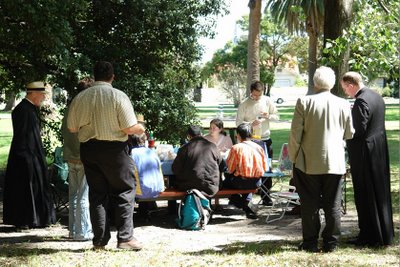
After Mass, we had a short, but lovely, picnic in the park, where we all took advantage of 'Sunday'. Following this we had a paper given on the Catholic character of Australian exploration. Very triumphalist. Very good. Secularists, we have three crosses on our flag! Socialists, come and get me!
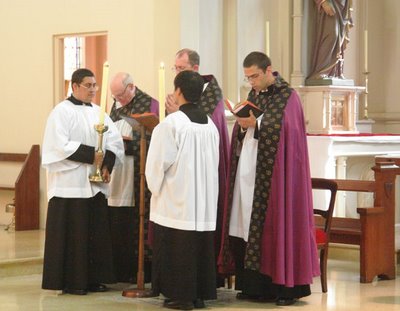
After the talk, we had the celebration of Vespers, which was beautiful. The servers did a wonderful job. I'm slowly picking up all those tones...
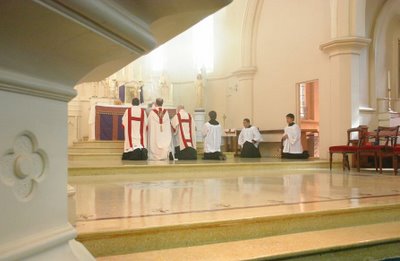
This was followed by Benediction. Dominus meus, et Deus meus.
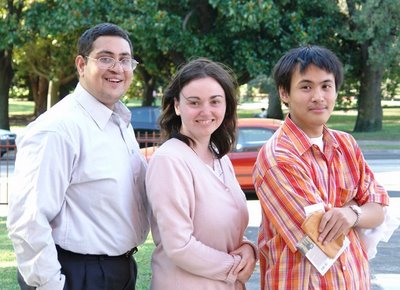
"The confirmed, the recently confirmed, and the 'to-be' confirmed" - Jude. Jude, myself, and Omar, who is to be confirmed this Sunday. Laetare. We are to welcome our regional bishop, and can't wait! Please pray for Omar, who is taking the name, Ildephonsus. There are two other candidates, please pray for them, too.
So, it is official, I am moving... Rather a scary thing, but it is a blessing to be able to do it in the week of the Solemnity of Saint Joseph. Sancte Joseph, ora pro nobis.

After Mass, we had a short, but lovely, picnic in the park, where we all took advantage of 'Sunday'. Following this we had a paper given on the Catholic character of Australian exploration. Very triumphalist. Very good. Secularists, we have three crosses on our flag! Socialists, come and get me!

After the talk, we had the celebration of Vespers, which was beautiful. The servers did a wonderful job. I'm slowly picking up all those tones...

This was followed by Benediction. Dominus meus, et Deus meus.

"The confirmed, the recently confirmed, and the 'to-be' confirmed" - Jude. Jude, myself, and Omar, who is to be confirmed this Sunday. Laetare. We are to welcome our regional bishop, and can't wait! Please pray for Omar, who is taking the name, Ildephonsus. There are two other candidates, please pray for them, too.
So, it is official, I am moving... Rather a scary thing, but it is a blessing to be able to do it in the week of the Solemnity of Saint Joseph. Sancte Joseph, ora pro nobis.
Wednesday, March 15, 2006
Compline and the Commonwealth Games
Today marked the opening of the Commonwealth Games, which happily enough, are being held in Melbourne. Although the majority of us do have some connection to the Commonwealth, I'm really quite interested in other things.
It was a treat to see a lovely fireworks display along the Yarra River while on the train home tonight, seeing people roam about the streets, perhaps a smidgen alike WYD, and having courteous cleaners coming through carriages to get rid of rubbish. It's like a Pontifical Mass. There is no reason why we can't have them every week!
While others were doing whatever it is they were doing, we were having Lenten devotions - a sermon, Stations, and Compline. We use those very helpful blue Compline books published by St Austin's Press. We have a number at the church, but a few weeks ago I bought one for private use, and so that I might practice. Last week, my Compline book was taken up with the others. I didn't say anything, I was happy for the church to have it, but deep down, I did miss it - not because it was 'my possession', but because it helped me to pray. I had just read of one Desert Father assisting a thief taking his goods, so I rejoiced in the Lord. I didn't mention it to anyone.
Tonight I was happy enough for things to stay as they were. If it was the Will of the Lord, I prayed, then I would be handed back my book. The Compline books were handed out, in no particular order. I received one, it looked a little worn, and not too familiar - I peeked inside... and there was my name. I was exceedingly happy, especially after doing the Stations. It was nice having the book back, but it was the Lord and His Saints who were the cause of my joy. Not that I should have been surprised. I share this not out of any pride, but out of joy. Laudate Nomen Domini.
I think I am about to move again..!
I thought, as the Lord has gifted us with sight, I might share an interior shot of the church that was taken by another tonight. We share the church with the parish, hence the free-standing altar, and the high altar in the background, 'dressed' in purple.
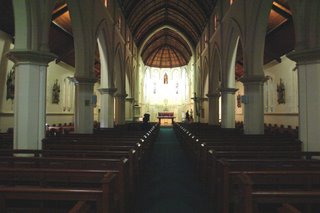
It was a treat to see a lovely fireworks display along the Yarra River while on the train home tonight, seeing people roam about the streets, perhaps a smidgen alike WYD, and having courteous cleaners coming through carriages to get rid of rubbish. It's like a Pontifical Mass. There is no reason why we can't have them every week!
While others were doing whatever it is they were doing, we were having Lenten devotions - a sermon, Stations, and Compline. We use those very helpful blue Compline books published by St Austin's Press. We have a number at the church, but a few weeks ago I bought one for private use, and so that I might practice. Last week, my Compline book was taken up with the others. I didn't say anything, I was happy for the church to have it, but deep down, I did miss it - not because it was 'my possession', but because it helped me to pray. I had just read of one Desert Father assisting a thief taking his goods, so I rejoiced in the Lord. I didn't mention it to anyone.
Tonight I was happy enough for things to stay as they were. If it was the Will of the Lord, I prayed, then I would be handed back my book. The Compline books were handed out, in no particular order. I received one, it looked a little worn, and not too familiar - I peeked inside... and there was my name. I was exceedingly happy, especially after doing the Stations. It was nice having the book back, but it was the Lord and His Saints who were the cause of my joy. Not that I should have been surprised. I share this not out of any pride, but out of joy. Laudate Nomen Domini.
I think I am about to move again..!
I thought, as the Lord has gifted us with sight, I might share an interior shot of the church that was taken by another tonight. We share the church with the parish, hence the free-standing altar, and the high altar in the background, 'dressed' in purple.

Well well
The Latin text of O Felix Roma dates from only 1993 (linked text auf Deutsch). Gosh.
Hope everyone's making a better fist of fasting than I am... let us pray for one another! As I'm sure you all are anyway.
Hope everyone's making a better fist of fasting than I am... let us pray for one another! As I'm sure you all are anyway.
Saturday, March 11, 2006
On the Efforts of Bilocation:
After Mass today, I entered into a brief chat with a dear lady whom hadn't visited us for some time.
Friend: "Long time no see!"
Visiting Friend: "Well, I can't be in two places at once, you know!"
Me: "That would be bilocation!"
Visiting Friend: (laughs) "Yes, bilocation! I'm afraid I don't have that gift. Even if I did, I'm really rather lazy!"
Et quia pulchra est:
et post dies sex adsumpsit Iesus Petrum et Iacobum et Iohannem fratrem eius et ducit illos in montem excelsum seorsum
et transfiguratus est ante eos et resplenduit facies eius sicut sol vestimenta autem eius facta sunt alba sicut nix
et ecce apparuit illis Moses et Helias cum eo loquentes
respondens autem Petrus dixit ad Iesum Domine bonum est nos hic esse si vis faciamus hic tria tabernacula tibi unum et Mosi unum et Heliae unum
adhuc eo loquente ecce nubes lucida obumbravit eos et ecce vox de nube dicens hic est Filius meus dilectus in quo mihi bene conplacuit ipsum audite
et audientes discipuli ceciderunt in faciem suam et timuerunt valde
et accessit Iesus et tetigit eos dixitque eis surgite et nolite timere
levantes autem oculos suos neminem viderunt nisi solum Iesum
et descendentibus illis de monte praecepit Iesus dicens nemini dixeritis visionem donec Filius hominis a mortuis resurgat
I apologise for the lack of formatting, but there seems to be no other online source before my eyes...
Finally, we have been very kindly listed by CatholicBlogs.com. Please support them - they provide a most helpful resource.
Friend: "Long time no see!"
Visiting Friend: "Well, I can't be in two places at once, you know!"
Me: "That would be bilocation!"
Visiting Friend: (laughs) "Yes, bilocation! I'm afraid I don't have that gift. Even if I did, I'm really rather lazy!"
Et quia pulchra est:
et post dies sex adsumpsit Iesus Petrum et Iacobum et Iohannem fratrem eius et ducit illos in montem excelsum seorsum
et transfiguratus est ante eos et resplenduit facies eius sicut sol vestimenta autem eius facta sunt alba sicut nix
et ecce apparuit illis Moses et Helias cum eo loquentes
respondens autem Petrus dixit ad Iesum Domine bonum est nos hic esse si vis faciamus hic tria tabernacula tibi unum et Mosi unum et Heliae unum
adhuc eo loquente ecce nubes lucida obumbravit eos et ecce vox de nube dicens hic est Filius meus dilectus in quo mihi bene conplacuit ipsum audite
et audientes discipuli ceciderunt in faciem suam et timuerunt valde
et accessit Iesus et tetigit eos dixitque eis surgite et nolite timere
levantes autem oculos suos neminem viderunt nisi solum Iesum
et descendentibus illis de monte praecepit Iesus dicens nemini dixeritis visionem donec Filius hominis a mortuis resurgat
I apologise for the lack of formatting, but there seems to be no other online source before my eyes...
Finally, we have been very kindly listed by CatholicBlogs.com. Please support them - they provide a most helpful resource.
Thursday, March 09, 2006
From 'The Australian' 9th March 2006
"THE comparison between the Crusades and the September 11 terrorists in a Victorian textbook was deliberately provocative and designed to spark debate, teachers said yesterday.
The idea that the Crusaders and their fight in a holy war shared similarities and "moral equivalence" with the September 11 terrorists was intended to teach students how to support an argument, educators said.
The book, Humanities Alive 2 developed for Year 8 students, was criticised this week by Melbourne University historian Barry Collett for being historically inaccurate and misleading in its depiction of the Crusades and the church [sic] during the Middle Ages.
Victorian president of the Australian Education Union Mary Bluett said the text relating the Crusades and September 11 was purposely provocative to spark discussion and tease out ideas from students.
"Clearly there's sensitivity around it and teachers as professionals would handle that sort of debate very carefully," she said.
Ms Bluett said the aim of the exercise was not to teach students that there were similarities between the Crusades and September 11, but to teach them the principles of mounting an argument.
"It's really about teaching young people to analyse the words being said, think about their response and justify their response. It's a tool for teaching them how to advance an opinion and back it up," she said.
Director of the teaching resources and textbook research unit at Sydney University Michael Horsley said how the textbook was used by teachers was more important than its content. "It isn't a matter of what's written on paper. Any text can be interpreted in many different ways by children - and that's where the teacher's knowledge and expertise comes in," he said.
He said history in Victoria was taught as part of a combined society and environment syllabus with geography and economics, rather than a stand-alone subject. As a result, textbooks covering all three subjects were necessarily simplified or carried little detail.
"This is not a history course; kids aren't necessarily studying medieval history for a longer period of time," he said."
From the Editorial for the 10th March, 2006:
"Like the Crusaders ... they were told they would go straight to heaven when they died", states the book, referring to bin Laden's henchmen. "Might it be fair to say that Crusaders who attacked the Muslim inhabitants of Jerusalem were also terrorists?"
While bin Laden's statements are certainly valuable texts for anyone studying the geopolitics of modern terrorism, they are not the way to teach high school students medieval history. And though the Crusades have never been particularly popular with the modern educational establishment (except as a bloody cudgel with which to bash the West) they are a critically important piece of world history that clearly still resonate today.
As a brief refresher, Muslim incursions into Byzantine territory went largely unremarked in the West for centuries, but the situation changed with the sacking of the Church of the Holy Sepulchre - the historical burial place of Jesus - in 1009 by the Caliph of Cairo. The Western response, in the form of the Crusades, was not an exercise in naked imperialism, but rather an effort to come to the aid of Christian co-religionists who were doing it tough under the Ottoman yoke. (Indeed, even after the Crusades, the Ottoman Empire's Muslim armies would come close to overrunning Europe, and were not decisively stopped until the Siege of Vienna in 1529 and another battle there in 1683.) It is critical to remember that the eastern Mediterranean had previously been held by the Byzantine empire, successor state to the Roman Empire, whose leaders in Constantinople (now Istanbul) spent years begging the Pope and western European kings for help even as they preserved the heritage of antiquity. Once in the East, Europeans rediscovered long-forgotten doctrines of the Greek philosophers (such as Aristotle, Plato and Socrates) and Roman government (articulated by countless thinkers and historians), as well as the new Arab numbering system. All these elements and more found fertile ground in a Europe looking to pick up the pieces from the Dark Ages, and they provided the fuel for the Renaissance of the 12th and 15th centuries and subsequent periods of Enlightenment and democratic revolution.
Not teaching these critical elements of how Western culture - of which Australia is a part - came to be to students is to in a sense cheat them of their heritage. Simply casting the Crusaders as a bunch of ignorant and bloodthirsty Europeans ignores this reality."
I'm particularly fond of the "cheat them of their heritage" bit. I'm dissatisfied with all this passively imposed delinquency - in the truest sense of the word, tracing back to its Latin roots.
The idea that the Crusaders and their fight in a holy war shared similarities and "moral equivalence" with the September 11 terrorists was intended to teach students how to support an argument, educators said.
The book, Humanities Alive 2 developed for Year 8 students, was criticised this week by Melbourne University historian Barry Collett for being historically inaccurate and misleading in its depiction of the Crusades and the church [sic] during the Middle Ages.
Victorian president of the Australian Education Union Mary Bluett said the text relating the Crusades and September 11 was purposely provocative to spark discussion and tease out ideas from students.
"Clearly there's sensitivity around it and teachers as professionals would handle that sort of debate very carefully," she said.
Ms Bluett said the aim of the exercise was not to teach students that there were similarities between the Crusades and September 11, but to teach them the principles of mounting an argument.
"It's really about teaching young people to analyse the words being said, think about their response and justify their response. It's a tool for teaching them how to advance an opinion and back it up," she said.
Director of the teaching resources and textbook research unit at Sydney University Michael Horsley said how the textbook was used by teachers was more important than its content. "It isn't a matter of what's written on paper. Any text can be interpreted in many different ways by children - and that's where the teacher's knowledge and expertise comes in," he said.
He said history in Victoria was taught as part of a combined society and environment syllabus with geography and economics, rather than a stand-alone subject. As a result, textbooks covering all three subjects were necessarily simplified or carried little detail.
"This is not a history course; kids aren't necessarily studying medieval history for a longer period of time," he said."
From the Editorial for the 10th March, 2006:
"Like the Crusaders ... they were told they would go straight to heaven when they died", states the book, referring to bin Laden's henchmen. "Might it be fair to say that Crusaders who attacked the Muslim inhabitants of Jerusalem were also terrorists?"
While bin Laden's statements are certainly valuable texts for anyone studying the geopolitics of modern terrorism, they are not the way to teach high school students medieval history. And though the Crusades have never been particularly popular with the modern educational establishment (except as a bloody cudgel with which to bash the West) they are a critically important piece of world history that clearly still resonate today.
As a brief refresher, Muslim incursions into Byzantine territory went largely unremarked in the West for centuries, but the situation changed with the sacking of the Church of the Holy Sepulchre - the historical burial place of Jesus - in 1009 by the Caliph of Cairo. The Western response, in the form of the Crusades, was not an exercise in naked imperialism, but rather an effort to come to the aid of Christian co-religionists who were doing it tough under the Ottoman yoke. (Indeed, even after the Crusades, the Ottoman Empire's Muslim armies would come close to overrunning Europe, and were not decisively stopped until the Siege of Vienna in 1529 and another battle there in 1683.) It is critical to remember that the eastern Mediterranean had previously been held by the Byzantine empire, successor state to the Roman Empire, whose leaders in Constantinople (now Istanbul) spent years begging the Pope and western European kings for help even as they preserved the heritage of antiquity. Once in the East, Europeans rediscovered long-forgotten doctrines of the Greek philosophers (such as Aristotle, Plato and Socrates) and Roman government (articulated by countless thinkers and historians), as well as the new Arab numbering system. All these elements and more found fertile ground in a Europe looking to pick up the pieces from the Dark Ages, and they provided the fuel for the Renaissance of the 12th and 15th centuries and subsequent periods of Enlightenment and democratic revolution.
Not teaching these critical elements of how Western culture - of which Australia is a part - came to be to students is to in a sense cheat them of their heritage. Simply casting the Crusaders as a bunch of ignorant and bloodthirsty Europeans ignores this reality."
I'm particularly fond of the "cheat them of their heritage" bit. I'm dissatisfied with all this passively imposed delinquency - in the truest sense of the word, tracing back to its Latin roots.
Wednesday, March 08, 2006
2008 Logo Ideas
Friends, I thought that I would post to let you know that we are currently accepting ideas for the 2008 Juventutem Australia logo. We need them as soon as possible. The theme is 'Emitte lucem tuam et veritatem tuam' - in accordance with the general WYD theme of '...You will be my witnesses'. It would also be good, of course, to include something Australian - perhaps most suitably the Southern Cross. We have already received a wonderful design, but I thought I would ask you for your input.
Please e-mail your ideas and designs here.
Deus benedicat vos.
Please e-mail your ideas and designs here.
Deus benedicat vos.
Tuesday, March 07, 2006
Monday, March 06, 2006
Happy Feast!
Today is the feast (commemoration) of SS Perpetua and Felicitas. Sadly, I couldn't go to Mass today!
When, she said, we were still under legal surveillance and my father was liked to vex me with his words and continually strove to hurt my faith because of his love: Father, said I, Do you see (for example) this vessel lying, a pitcher or whatsoever it may be? And he said, I see it. And I said to him, Can it be called by any other name than that which it is? And he answered, No. So can I call myself nought other than that which I am, a Christian.
-St Perpetua
In other news, we had a random encounter with his Grace, and got our Missals blessed! 'Archbishop blesses 1962 Missals!' We were blessed by the Lord too, to have permission for some material promoting the Liturgy left in the Cathedral - with a picture of the Pontifical last year, of course! Please pray that souls will be led to discover their spiritual heritage.
Weren't the propers for yesterday just beautiful? Vade Satana.
When, she said, we were still under legal surveillance and my father was liked to vex me with his words and continually strove to hurt my faith because of his love: Father, said I, Do you see (for example) this vessel lying, a pitcher or whatsoever it may be? And he said, I see it. And I said to him, Can it be called by any other name than that which it is? And he answered, No. So can I call myself nought other than that which I am, a Christian.
-St Perpetua
In other news, we had a random encounter with his Grace, and got our Missals blessed! 'Archbishop blesses 1962 Missals!' We were blessed by the Lord too, to have permission for some material promoting the Liturgy left in the Cathedral - with a picture of the Pontifical last year, of course! Please pray that souls will be led to discover their spiritual heritage.
Weren't the propers for yesterday just beautiful? Vade Satana.
Thursday, March 02, 2006
From the first Archbishop of Sydney
Let the Church be the place of rest to your wearied thoughts, and a participation in the assemblies of the faithful your chief consolation.
+ John Bede Polding, from 1844 Lenten Pastoral.
+ John Bede Polding, from 1844 Lenten Pastoral.
Wednesday, March 01, 2006
Correct Latin Pronunciation?
If you cannot abide pedantry then please do not read this post. You have been warned.
For many people attending the Latin Mass, who like myself studied Latin at school, the pronunciation will seem quite different, even clumsy, to that which we were taught in school. Contemporary ecclesiastical Latin usually has a marked Italian accent. However this is quite different from how Latin was originally spoken. For instance one can note the following major points of difference - C is pronounced as K in classical Latin, whereas in ecclesiastical Latin it can be pronounced as 'K', 'CH' or 'S'.Likewise the letter V is pronounced as W in classical Latin but as V in ecclesiastical Latin.
My,very pedantic point would be rather than accepting a difference between classical and ecclesiastical Latin, if there is a correct pronunciation maybe it should be followed. Classical Latin being the elder of the two would point towards it being the more authoritative and therefore the better pronunciation to employ. Admittedly this might sound rather strange to many ears - 'Gloria in Exkelsis' rather than 'Gloria in Exchelsis'or Salwe Regina Mater Miserikordiae, Wita Dulkedo rather than Salve Rejina Mater miserikordiae, vita dulchedo.

Yes it does sound pretty strange to what we're used to at Mass and it is a harder sound than the Italianate pronunciation but I think it's worth consideration.
Kikero or Sisero?
